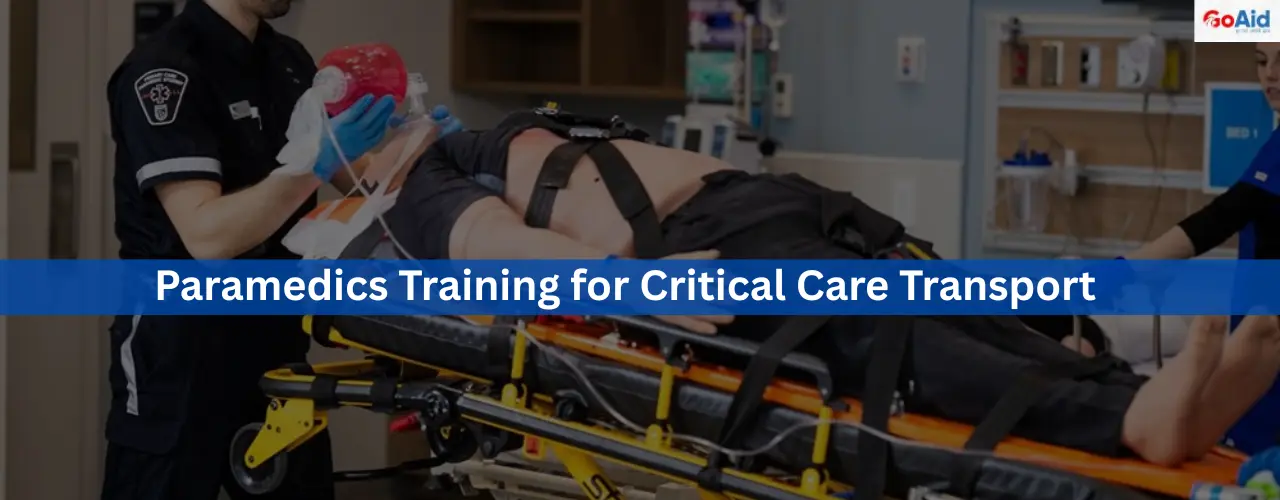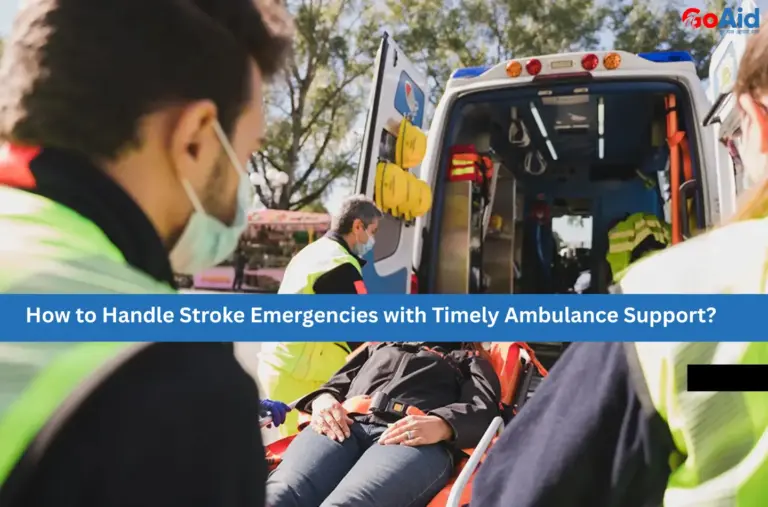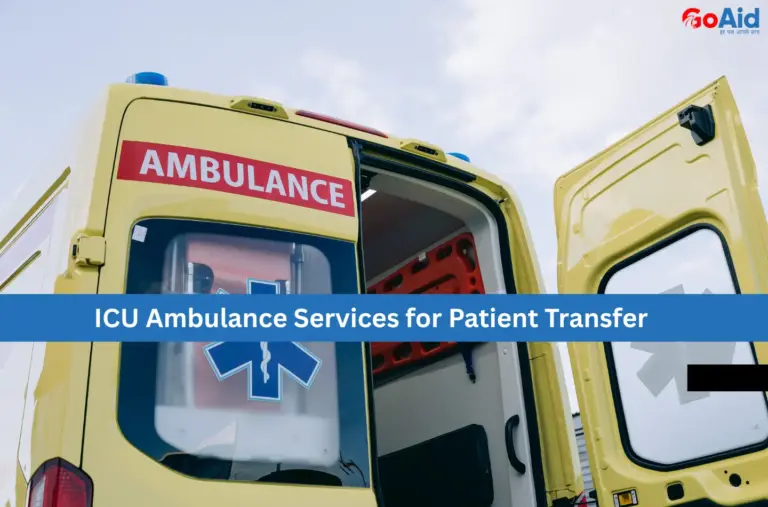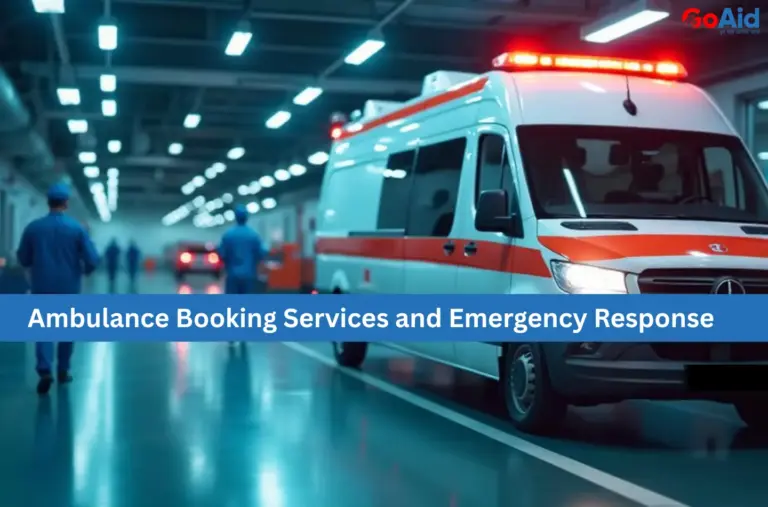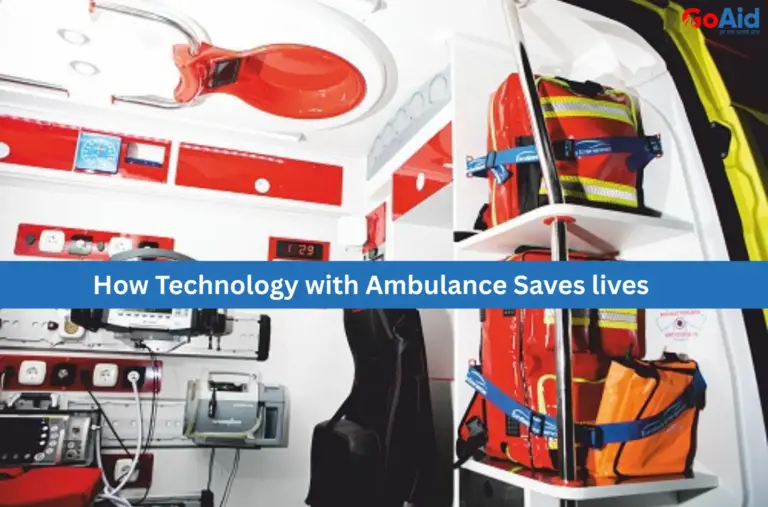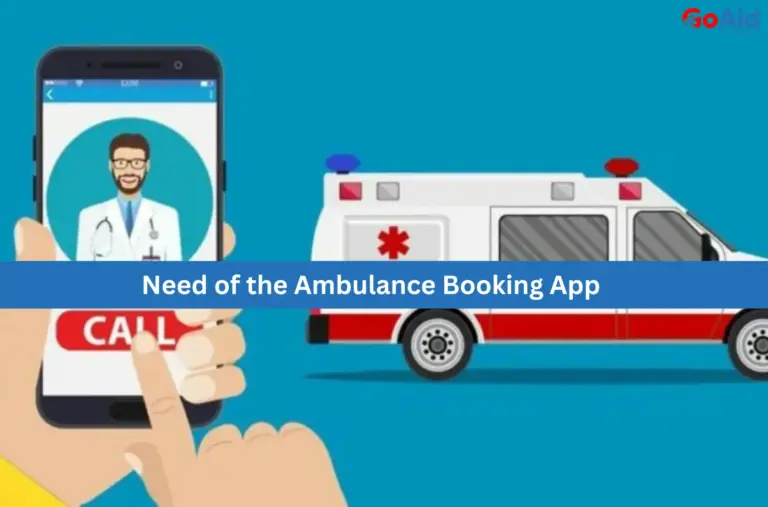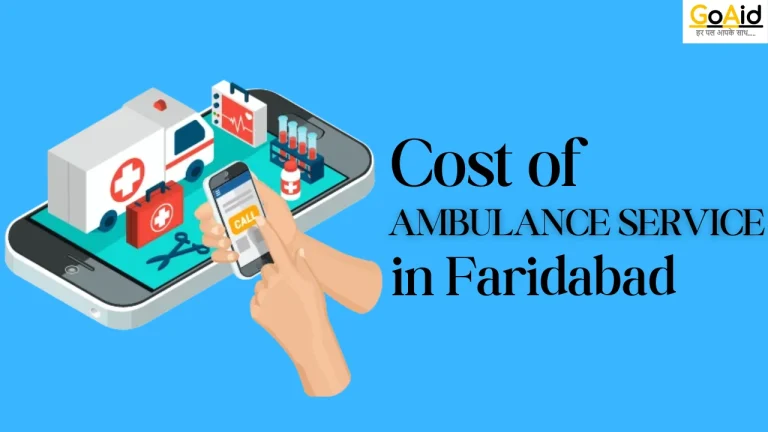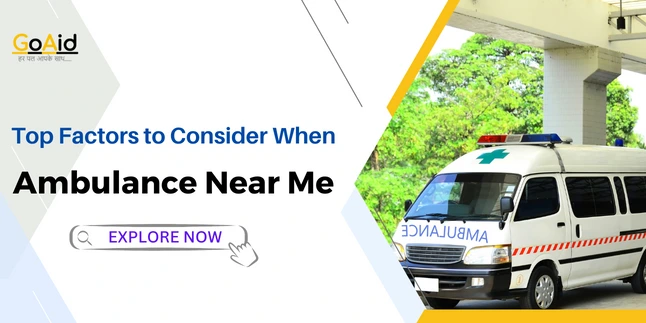In a medical emergency, Paramedics play a very important role. GoAidŌĆÖs paramedics’ training for critical care transport is essential to ensure they can efficiently handle medical emergencies. They provide timely care and life-saving support during medical transportation.
This blog provides you the information about their training process during a critical time, and Why Our Training Makes a Difference in Patient Outcomes. Are you interested in knowing about GoAidŌĆÖs Paramedics? Then this blog is for you.
LetŌĆÖs start reading
Complete Details about Critical Care Paramedic Training
Critical Care Paramedic training involves specialized education in handling severe medical emergencies during transport. The training covers advanced skills in airway management, medication administration, and life support systems, ensuring paramedics can manage patients in critical condition.
What is a Critical Care Paramedic?
A Critical Care Paramedic is a trained medical professional responsible for transporting critically ill or injured patients. They are skilled in providing advanced care during transport, including monitoring vital signs, managing complex medical emergencies, and delivering life-saving interventions.
How to Become a Critical Care Paramedic?
To become a critical care paramedic, you must:
- Complete Basic Paramedic Training: Obtain a paramedic certification from a recognized institution, providing foundational knowledge in emergency care.
- Gain Experience as an EMT or Paramedic: Spend time working as a basic EMT or paramedic to build experience in patient care and transport.
- Enroll in a Critical Care Paramedic Course; Pursue a specialized training course focusing on critical care transport, advanced life support, and emergency medical procedures.
- Pass Certification and Licensing Exams: Clear the required certification and licensing exams for critical care paramedics to become officially qualified.
- Pursue Continued Education: Engage in ongoing education to stay current with advancements in critical care practices and transport protocols.
Details about Critical Care Paramedic Training in India
Critical Care Paramedic training in India includes intensive preparation for managing complex medical emergencies. Here are key details:
- Certification Programs: Training institutes offer certified courses for aspiring critical care paramedics across India.
- Duration of Courses: The training typically lasts 6 to 12 months, depending on the program and specialization.
- Advanced Life Support Skills: Trainees learn to operate advanced life support equipment and provide critical interventions during transport.
- Hands-On Training: Paramedics receive practical experience in dealing with real-life emergency scenarios through simulations and supervised practice.
- Government-Approved Courses: Most programs are government-approved, ensuring a standardized level of education and recognition.
- Interstate Ambulance Service Training: Training includes interstate critical care transport protocols to ensure paramedics can manage long-distance patient transport effectively.
- Paramedic Certification Exams: After completing training, candidates must pass exams to be certified as critical care paramedics.
- Specialized Equipment Training: Paramedics are trained in the use of advanced medical equipment such as ventilators, defibrillators, and other life-saving devices.
- Focus on Patient Care: The training emphasizes patient comfort and safety, with paramedics learning to manage both physical and emotional aspects of care.
- Continuous Professional Development: Paramedics are encouraged to pursue further education to keep up with evolving medical practices.
Critical Care Paramedic Exam in India
The Critical Care Paramedic exam in India tests the knowledge and skills required to provide advanced medical care during transport. It includes written assessments, practical evaluations, and scenario-based tests, ensuring that candidates are fully equipped to handle emergencies with expertise. Passing this exam is necessary to earn the title of a certified Critical Care Paramedic.
Critical Care Paramedic Training Programme
The Critical Care Paramedic training program in India includes the following key components:
- Advanced Medical Skills: In-depth training in advanced life support, airway management, and trauma care.
- Hands-On Practice: Simulated scenarios and real-life training ensure paramedics gain practical experience.
- Patient Monitoring: Training in the use of critical care monitoring equipment for ongoing patient assessments.
- Emergency Transport Protocols: Understanding the procedures for transporting patients safely and efficiently.
- Specialized Emergency Techniques: Paramedics learn specialized techniques, including intravenous therapy and medication administration.
- Teamwork and Communication: Effective communication with healthcare teams is emphasized for coordinated patient care.
- Patient Comfort and Psychological Care: Focus on emotional support and comfort for patients during critical transport.
Critical Care Paramedic Salary in India
The salary of a Critical Care Paramedic in India varies depending on experience and location. On average, they earn between Ōé╣30,000 to Ōé╣60,000 per month. With experience, certification, and advanced skills, salaries can increase, particularly for those working in private hospitals or ambulance services. Additional benefits may include allowances for long-distance transport or emergency duty.
How GoAid Trains Its Paramedics for Critical Care Transport?
GoAid offers specialized training for critical care paramedics. Key training features include:
Real-Life Scenario Practice
Paramedics undergo rigorous practical training through simulations and real emergency scenarios.
Advanced Medical Equipment Handling
Hands-on training with the latest medical equipment ensures paramedics can handle critical care tools effectively.
12-Month Comprehensive Course
GoAid provides an in-depth 12-month course covering both theoretical and practical aspects of critical care transport.
Government-Approved Certification
Trainees receive certification recognized by government bodies after successful completion of the program.
Patient-Centered Care
The program emphasizes holistic patient care, ensuring comfort during transport.
Team Coordination
Emphasis on teamwork and coordination between paramedics, doctors, and hospital teams.
Continuous Professional Development
Paramedics at GoAid are encouraged to pursue ongoing training and certifications.
Specialized Critical Care Techniques
Trainees learn advanced techniques for handling cardiac, neurological, and trauma emergencies.
Post-Course Evaluation
Comprehensive assessments ensure the readiness of paramedics for real-world situations.
Global Standards of Training
GoAidŌĆÖs training adheres to international standards, preparing paramedics to handle critical care transport across borders.
Also Read: GoAidŌĆÖs Care in Monsoon Emergencies in India
Key Points We Consider for Critical Care Transport
Key points emphasized during critical care transport training include:
- Advanced Medical Care: Paramedics are trained to provide advanced life-saving care, including medication administration and intubation.
- Efficient Communication: Communication protocols with healthcare facilities ensure a smooth transfer of patient care.
- Safety Protocols: Ensuring patient and staff safety during transport, including monitoring and managing risks.
- Patient Monitoring: Constant patient monitoring for vital signs and immediate intervention when necessary.
- Clinical Decision Making: Paramedics are trained to make quick, accurate decisions based on patient conditions.
- Multidisciplinary Collaboration: Coordination with healthcare teams ensures that the patient receives seamless care from transport to the hospital.
- Post-Transport Evaluation: After transport, paramedics conduct a thorough debrief and assessment to improve future practices.
Know More: Role of First-Aid in Emergency Ambulance Services
Use of Advanced Medical Equipment During Training
Advanced medical equipment training is crucial for effective critical care transport. Key points include:
- Ventilator Training: Paramedics are trained in the operation of ventilators to assist patients with breathing difficulties.
- Cardiac Monitoring: Training in using defibrillators and ECG machines to monitor heart conditions.
- Intravenous (IV) Equipment: Paramedics learn the correct use of IV pumps, fluids, and medications during transport.
- Advanced Airway Devices: Techniques for using endotracheal tubes and other airway management tools are taught.
- Trauma Care Equipment: Paramedics are trained in managing trauma using specialized medical equipment like splints and collars.
- Portable Imaging Devices: Knowledge of how to use portable ultrasound and X-ray equipment is covered.
- Lifesaving Medications: Training includes the administration of medications like sedatives, analgesics, and emergency drugs.
Why Our Training Makes a Difference in Patient Outcomes?
GoAidŌĆÖs training program ensures that paramedics are equipped with the knowledge and skills to improve patient outcomes. Key reasons include:
- Comprehensive Care Training: Paramedics are trained in both emergency and critical care, enhancing their ability to save lives.
- Focus on Patient Safety: Emphasis on patient safety ensures minimal risk during transport and interventions.
- Skilled Decision-Making: Paramedics make informed, timely decisions that significantly impact patient recovery.
- Advanced Equipment Use: Expertise in advanced equipment helps provide better care during transport.
- Coordination with Hospitals: Effective communication with hospitals ensures a smooth transfer of critical patients.
- Mental and Emotional Support: Paramedics are trained to offer emotional comfort to patients and their families.
- Regular Skill Updates: Continuous education ensures paramedics stay updated with the latest medical practices and technologies.
Book Ambulance: GoAid Ambulance Service
Conclusion to the Paramedics Training for Critical Care Transport
Training paramedics for critical care transport is essential to delivering high-quality care during emergencies. By combining theoretical knowledge with hands-on practice, advanced equipment training, and patient-focused care, we ensure that our paramedics are fully prepared to handle any critical situation with confidence and skill.
FAQs related to the Paramedics Training for Critical Care Transport
Question 1: What is Critical Care Paramedic Training?
Answer: Critical Care Paramedic Training is a specialized program that equips paramedics with advanced skills to manage critically ill patients during transport, including advanced life support and monitoring techniques.
Question 2: How do I become a Critical Care Paramedic?
Answer: To become a critical care paramedic, you must complete basic paramedic training, gain experience, pursue a critical care paramedic course, pass exams, and obtain certification.
Question 3: How long does Critical Care Paramedic Training last?
Answer: Critical Care Paramedic training typically lasts between 6 to 12 months, depending on the program’s depth and specializations.
Question 4: What salary can a Critical Care Paramedic expect in India?
Answer: Critical Care Paramedics in India can expect a salary ranging from Ōé╣30,000 to Ōé╣60,000 per month, with the potential for higher earnings based on experience.
Question 5: What are the key responsibilities of a Critical Care Paramedic?
Answer: A Critical Care Paramedic is responsible for providing advanced medical care during transport, including monitoring vital signs, managing airways, and delivering life-saving interventions.
Question 6: Is there an exam for becoming a Critical Care Paramedic?
Answer: Yes, candidates must pass a certification exam to become a Critical Care Paramedic, which tests their knowledge and practical skills in handling critical care scenarios.
Question 7: What is included in the Critical Care Paramedic course?
Answer: The course includes advanced life support, airway management, trauma care, patient monitoring, and the use of medical equipment essential for critical care transport.
Question 8: Is there a critical care paramedic online course available?
Answer: Yes, there are several online courses available for Critical Care Paramedics, offering flexibility in training and certification.
Question 9: What are the career prospects for Critical Care Paramedics?
Answer: Critical Care Paramedics have good career prospects in hospitals, private ambulance services, and emergency medical services, with opportunities for specialization and advancement.
Question 10: Does GoAid offer Critical Care Paramedic training?
Answer: Yes, GoAid provides comprehensive Critical Care Paramedic training, focusing on advanced medical skills, patient care, and the use of cutting-edge equipment for emergency transport.

